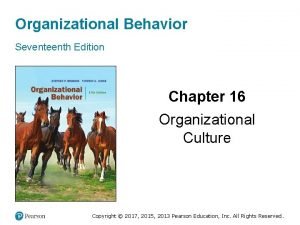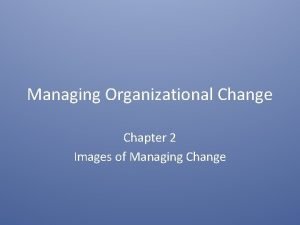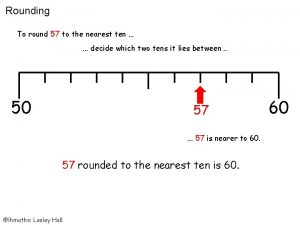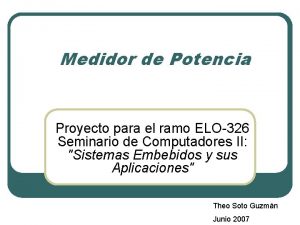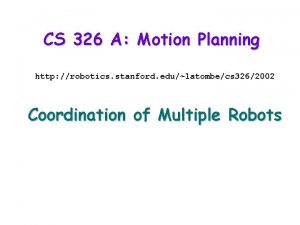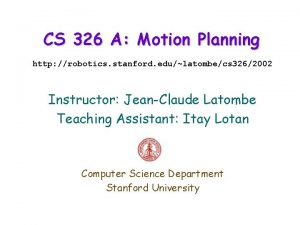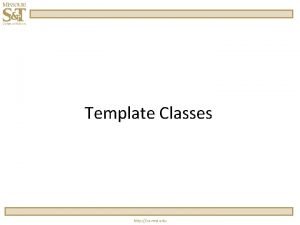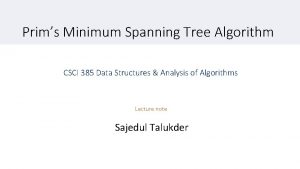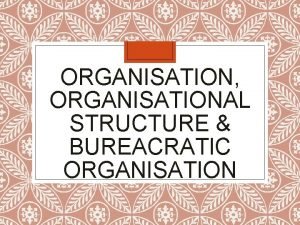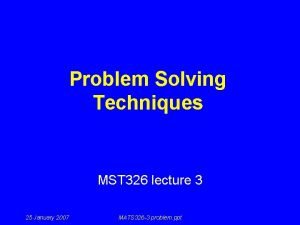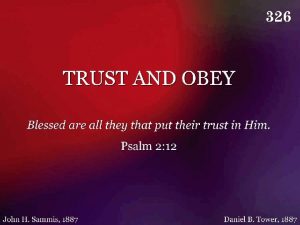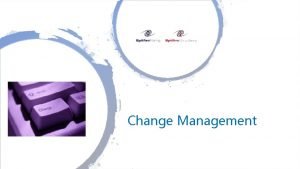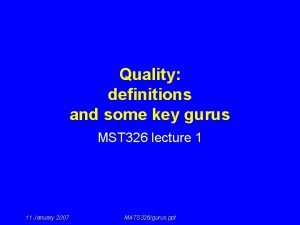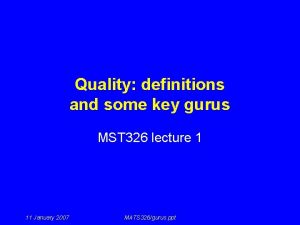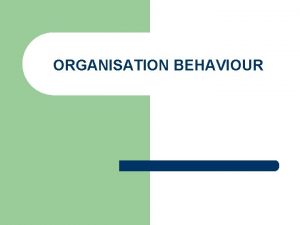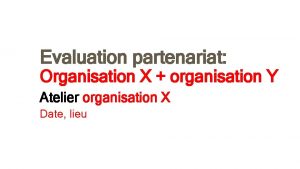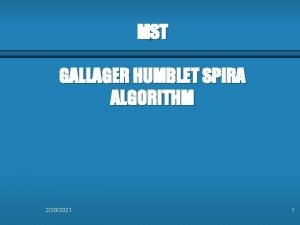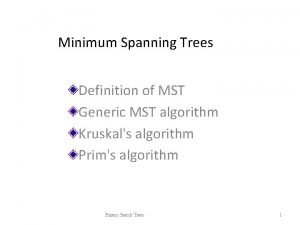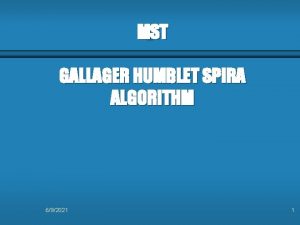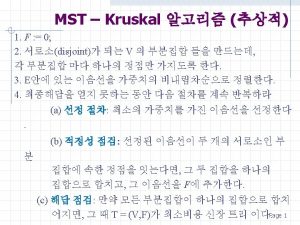Organisation cultures Change management MST 326 lecture 10


























- Slides: 26

Organisation cultures Change management MST 326 lecture 10 8 March 2007 MATS 326/culture. ppt

Fons Trompenaars: “Riding the waves of culture understanding cultural diversity in business” • “International managers have it tough. They must operate on a number of different premises at any one time. • These premises arise from #their culture of origin #the culture in which they are working, and #the culture of the organisation which employs them” 8 March 2007 MATS 326/culture. ppt

The meaning of culture • A fish only discovers its need for water when it is no longer in it • Our own culture is like water to a fish #it sustains us #we live and breathe through it • What one culture may regard as essential, may not be so vital to other cultures #e. g. material wealth 8 March 2007 MATS 326/culture. ppt

Culture is the context in which things happen • “If you are going to do business with the French, you will first have to learn how to lunch extensively” [FT]. • Gross generalisation? : #Southern (catholic) Europe • people first, business second #Northern (protestant) Europe • business first, people second 8 March 2007 MATS 326/culture. ppt

Basic cultural differences • relationships with people • attitudes to time #a direct line to the future #a respect for past, present and future • attitudes to the environment #nature as a thing to be feared or emulated 8 March 2007 MATS 326/culture. ppt

Relationships with people • Universalism vs particularism #greater good or unique circumstances • Individualism vs collectivism #the individual vs the group • Neutral vs emotional #expression of feelings • Specific vs diffuse #direct approach or deep understanding • Achievement vs ascription #how status is accorded 8 March 2007 MATS 326/culture. ppt

Layers of culture • The outer layer #artefacts and products (explicit) #language, food, buildings, markets, fashion • The middle layer #norms - right or wrong behaviour #values - good or bad aspirations/desires • The inner layer #basic assumptions (implicit) #survival within the culture 8 March 2007 MATS 326/culture. ppt

Culture as a normal distribution • Not all people in a culture have identical sets of artefacts, norms, values and assumptions • . . but there is usually a pattern spread around some average value • BEWARE of stereotyping #individual personality mediates the culture 8 March 2007 MATS 326/culture. ppt

Hard work? hard work is essential to a prosperous society OR do not work harder than other members of the group because then we would all be expected to do more and would end up worse off. 8 March 2007 MATS 326/culture. ppt

Cultural phenomena • • • Authority Bureaucracy Creativity Good fellowship Verification Accountability #all experienced in different ways! 8 March 2007 MATS 326/culture. ppt

Performance • Pay for individual performance #NL, UK, USA • Recognition of benefits to colleagues #France, Germany, Asia 8 March 2007 MATS 326/culture. ppt

Globalisation • When in Rome. . . ? • Some products seem to transcend cultures • consider dining at Mc. Donalds #fast food for a fast buck in New York #a show of status in Moscow or Beijing 8 March 2007 MATS 326/culture. ppt

Verbal communication • Anglo-Saxon #when A stops, B starts • Latin #interruptions imply interest • Oriental #space to reflect on what the other said 8 March 2007 MATS 326/culture. ppt

Verbal communication • Anglo-Saxon #some rising and falling of tone • Latin #exaggerated changes in tone • Oriental #self-controlled monotone #lower flatter voice implies higher position 8 March 2007 MATS 326/culture. ppt

Non-verbal communication • • eye contact body language personal space touching 8 March 2007 MATS 326/culture. ppt

Corporate cultures • Family person/hierarchy #power-oriented culture • Eiffel tower task/hierarchy #role-oriented culture • Guided missile task/egalitarian #project-oriented • Incubator person/egalitarian #fulfilment-oriented 8 March 2007 MATS 326/culture. ppt

Sustainable Leadership Grid comparing Rhineland Anglo/US models Rhineland Anglo/US top team speaker decision maker, hero Decision making consensual manager-centred Ethical behaviour an explicit value ambivalent Financial markets challenge them follow them Innovation strong a challenge Knowledge management shared a challenge yes no grow their own import managers Organisational culture strong a challenge People priority strong lip-service high is a given difficult to deliver Retaining staff strong weak Skilled workforce strong challenged Social responsibility strong underdeveloped Environmental responsibility strong underdeveloped broad focus shareholders self-governing manager-centred Grid Elements CEO concept Long-term perspective Management development Quality Stakeholders Teams Uncertainty and change 8 March 2007 Union-management relations considered process MATS 326/culture. ppt co-operation fast adjustment conflict

Change management 8 March 2007 MATS 326/culture. ppt

Hierarchy of change intensity Reactive Adaptation Re-creation Anticipatory Tuning Re-orientation Incremental Discontinuous 8 March 2007 MATS 326/culture. ppt

Attention from senior management Intensity hierarchy Adaptation Re-creation Tuning Re-orientation Organisational complexity 8 March 2007 MATS 326/culture. ppt

Kotter’s eight stages • • establish a sense of urgency create a guiding coalition develop a vision and strategy communicate the change vision empower employees generate short term wins consolidate gains for more change anchor new approaches 8 March 2007 MATS 326/culture. ppt

Kotter’s eight errors • • too much complacency under-powered coalition under-estimating power of vision seriously under-communicating vision permitting obstacles to block change failing to generate short term wins declaring victory too soon not anchoring changes in the culture 8 March 2007 MATS 326/culture. ppt

Kotter’s five consequences arising from the eight errors • • • new strategies not implemented well gains do not achieve expected synergies long time-scales and high costs down-sizing does not control costs anticipated results not realised 8 March 2007 MATS 326/culture. ppt

How do you manage change? http: //cmckc. meridianksi. com/kc/cmc_portal/manage 2. asp In the words of Fred Nickols, "The honest answer is that you manage it pretty much the same way you'd manage anything else of a turbulent, messy, chaotic nature…" • The first thing you do is jump in. You can't do anything about it from the outside. • A clear sense of mission or purpose is essential. • Build a team. "Lone wolves" have their uses, but managing change isn't one of them. On the other hand, the right kind of lone wolf makes an excellent temporary team leader. • Maintain a flat organizational team structure and rely on minimal and informal reporting requirements. • Pick people with relevant skills and high energy levels. You'll need both. • Toss out the rule book. Change, by definition, calls for a configured response, not adherence to prefigured routines. • Shift to an action-feedback model. Plan and act in short intervals. Do your analysis on the fly. No lengthy up-front studies. Remember the hare and the tortoise. • Set flexible priorities. You must have the ability to drop what you're doing and tend to something more important. 8 March 2007 MATS 326/culture. ppt

http: //www. change-management. net/ 8 March 2007 MATS 326/culture. ppt

Some URLs for • • Change Management http: //www. janus. org/ http: //home. att. net/~nickols/change. htm http: //www. change-management. net/ http: //www. change-management. org/ • http: //home. snafu. de/h. nauheimer/index. htm • http: //www. managementfirst. com/articles_print/communications_print. htm • http: //www. managementfirst. com/articles/resistance. htm • http: //www. outsights. com/systems/columbo. htm 8 March 2007 MATS 326/culture. ppt
 Spiritual organization
Spiritual organization 01:640:244 lecture notes - lecture 15: plat, idah, farad
01:640:244 lecture notes - lecture 15: plat, idah, farad 6 images of change management
6 images of change management Rsg 326-2017-minedu
Rsg 326-2017-minedu Principezinho
Principezinho 4 sinf ona tili 48 mashq
4 sinf ona tili 48 mashq 57 rounded to the nearest hundred
57 rounded to the nearest hundred Elo-326
Elo-326 Ssis-326
Ssis-326 Cs 326 stanford
Cs 326 stanford Cs 326 stanford
Cs 326 stanford Bismarckk
Bismarckk 326 ce
326 ce Redondear a la decena de millar ejemplos
Redondear a la decena de millar ejemplos Cs 326 stanford
Cs 326 stanford Lei 11 326
Lei 11 326 326 os kormányrendelet 2013
326 os kormányrendelet 2013 Ac 326
Ac 326 Cse 326
Cse 326 Huffman coding
Huffman coding Cse 326
Cse 326 Mst physics 2135
Mst physics 2135 Blackboard mst
Blackboard mst Mst trace
Mst trace Mst powerpoint template
Mst powerpoint template Prim 算法
Prim 算法 Mst physics 1135
Mst physics 1135
